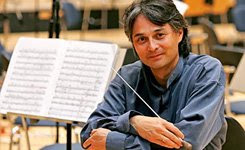 Jun Märkl, music director of the Orchestre national de Lyon, took the reigns of the Baltimore Symphony Orchestra this week. The pairing of Stravinsky's music for the ballet Apollon musagète and Mozart's setting of the Requiem Mass, heard on Saturday night at Strathmore, was unusual enough to raise my interest, expectations that were partially disappointed. Märkl has made a name conducting modern music, as he did with Schnittke's Gesualdo a few years ago, although Jens was not that impressed with Märkl's Messiaen in Munich last year. It was certainly worth the trip to the suburbs to hear Stravinsky's Apollo, a work we have never reviewed live here at Ionarts and only once in a recording by the Stuttgarter Kammerorchester (ECM).
Jun Märkl, music director of the Orchestre national de Lyon, took the reigns of the Baltimore Symphony Orchestra this week. The pairing of Stravinsky's music for the ballet Apollon musagète and Mozart's setting of the Requiem Mass, heard on Saturday night at Strathmore, was unusual enough to raise my interest, expectations that were partially disappointed. Märkl has made a name conducting modern music, as he did with Schnittke's Gesualdo a few years ago, although Jens was not that impressed with Märkl's Messiaen in Munich last year. It was certainly worth the trip to the suburbs to hear Stravinsky's Apollo, a work we have never reviewed live here at Ionarts and only once in a recording by the Stuttgarter Kammerorchester (ECM). Stravinsky composed this score in 1927 to 1928, as a commission for the Library of Congress, where the work was premiered, although it was soon after premiered in a more famous version with choreography by Balanchine for the Ballets Russes. The title refers to Apollo's role as leader of the nine muses, and the plot revolves around Apollo's choice among three of the muses -- the wild Terpsichore, muse of dance (and music), ends up in the pas de deux with Apollo, not brainy Calliope (eloquence, epic poetry) or that wet blanket Polyhymnia (sacred poetry). Märkl brought choreographic grace to his interpretation of the score, from a Satie-like waltz for the Pas d'action, through the lithe suite of neo-Baroque dances, to the dulcet, Ravelesque Pas de deux, the score's centerpiece.
For a program that saw the orchestra reduced to 18th-century size, several principal players apparently had the week off, but fortunately not concertmaster Johnathan Carney, who played the extensive violin solos with an elegant and clear line. The ensemble playing was clean and active, with the Coda movement treated like a sort of Offenbach galop, a Chaplin escapade in which one fully expected to hear ratchets, whistles, and other comic sound effects. We will have another chance to evaluate Jun Märkl's conducting when he returns to the area later this spring, to conduct the National Symphony Orchestra (May 14 to 16), in a program of Schumann and Mozart, with pianist Garrick Ohlsson.
Jun Markl leads Baltimore Symphony, Choral Arts in pairing of Mozart, Stravinsky (Clef Notes, March 6) |
Next week the Baltimore Symphony Orchestra plays a program of Dvořák and Chopin, with Czech pianist Lukáš Vondrácek (March 19 to 22).
No comments:
Post a Comment